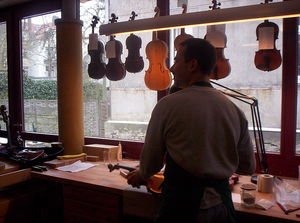Many people fail to pursue the arts and then later regret it. Becoming a concert violinist is not an easy path, but those who have made it to Carnegie Hall insist that they wouldn’t have it any other way. Traveling from concert hall to concert hall, doing what you love for money and continually increasing your mastery of the violin might prove to be the ultimate career choice. After all, you’ll never know until you try. Following are tips on how to become a concert violinist.
Start Early
Studies show that people who learn to play the violin at a young age find the task much less challenging and can find work far earlier. This isn’t to say that you can’t become a concert violinist if you don’t discover the craft until you’re forty-three, but if you have any interest at all, it’s always best to start when you are young. Most junior high and high school music programs will teach you how to play the violin, and experts recommend that you hire a private teacher as well. If you do start later in life, you would be well served to take private lessons and to practice for long hours on your own.
Major in Music
Don’t think that just because you know how to play the violin, you should skip college and head right to auditions. Studies show that students who have been taught theory, composition and other aspects of music are far more likely to succeed as concert violinists. It is important to know as much as possible about your craft, and it wouldn’t hurt to learn how to play other instruments as well. Not only that, but if something stops you from becoming a concert violinist, having a college degree will allow you to teach music later on. It’s always good to have a “fall-back” career.
Find an Internship
After you’ve graduated college or while you’re finishing your final coursework, start looking for internships at music festivals and conservatories. An internship will give you the opportunity to work with the best, while will put you on the right path to becoming a concert violinist. If you aren’t sure where to start looking, visit ArtsInternships.com, which has listings for paid and unpaid music internships as well as employment opportunities. You can also try MusicInternships.net, but this is not a free service to job seekers.
Attend Several Auditions
Once you are ready to become a concert violinist, attend as many auditions as you can find. The first few months of auditions should serve to prepare you for the process, which can be quite intimidating. Dressing up and performing in front of the top musicians in the world can do a number on your nerves, but you’ll find that it gets easier the more you do it. Get used to sitting up on stage with all eyes on you, then really start concentrating on finding work.
Prepare to Travel
Unfortunately, the best opportunities to become a concert violinist won’t be located in your backyard. This job requires travel, and lots of it. You might even have to fly cross-country for an audition in which you are interested, but you’ll find that it’s worth it. Use Travelocity.com and Expedia.com to book your travel arrangements so that you get the best prices on air fare and rental cars, and stay on the lookout for coupons and discounts. If you have friends who are also trying to become concert violinists, consider sharing hotel rooms and cars to save money.
Become Self-Employed
Very few concert violinists — no matter their talent — will make it in the first few months (or even years) of their auditions. Supplement your income by becoming self-employed. This will allow you to travel at will and won’t interfere with your audition schedule. There are plenty of ways to make money as a self-employed individual, particularly if you have another talent.
Join Organizations
Since struggling musicians often lack health benefits and are often without steady pay, you might want to join an organization like the American Federation of Musicians (afm.org). They will help you to find work and will also help you negotiate contracts, which can be an enormous support system.


